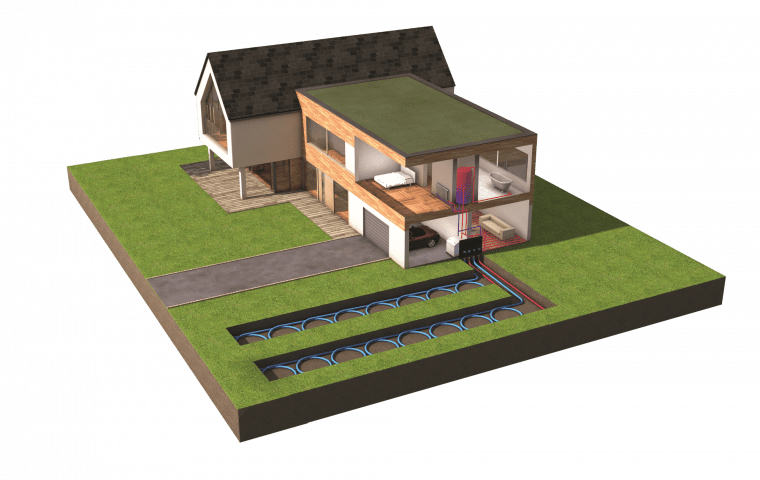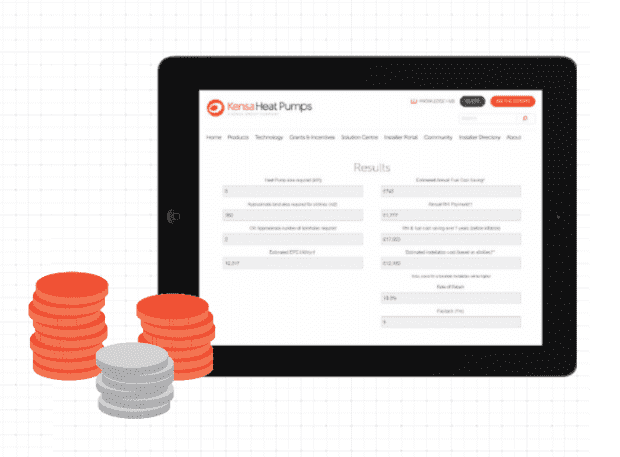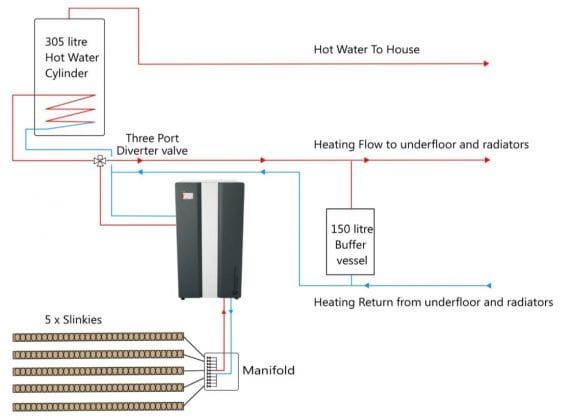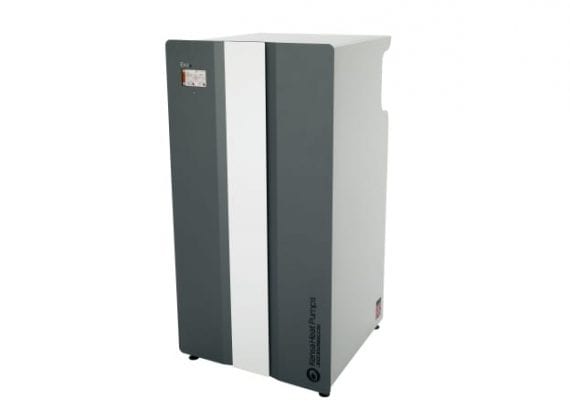Ground source heat pumps are perfect for domestic projects such as new builds, refurbishments, barn conversions and heating replacements. They deliver domestic heating and hot water all year round.

Ground source heat pumps are perfect for domestic projects such as new builds, refurbishments, barn conversions and heating replacements. They deliver domestic heating and hot water all year round.

A heat pump is ideal for self-builds because it’s a fit-and-forget technology that is low-carbon and simple to use.
Easily integrating with your preferred controls, heating distribution system or other renewable technology, a heat pump can be as smart or as simple as you like. Unlike fossil fuel heating systems, a Kensa heat pump doesn’t need servicing and requires minimal maintenance over its 20-year design life.
Kensa’s MCS-accredited heat pumps such as the Evo ground source heat pump, are highly efficient products delivering much more energy than they consume.
From April 2022, the government-funded Boiler Upgrade Scheme will provide a grant of £7,500 to those investing in a ground source heat pump.
Ground source heat pumps can reduce heating bills by 30 – 50% compared to oil and LPG.
The government-funded Boiler Upgrade Scheme will provide a grant of £7,500 to those investing in a ground source heat pump.
Experience little to no disruption over the heat pump’s 20-year design life, with low maintenance and no need for annual servicing.
Heat pumps are non-combustible. They reduce households’ CO2 emissions to achieve a greener and cleaner future for years to come.
Heat pumps are suitable for both new-builds and retrofit installations in existing homes, improving energy efficiency.
Unlike air source heat pumps, ground source heat pumps don’t usually require planning permission. That’s one less thing to worry about during a build or renovation.
Kensa manufactures some of the best heat pumps for homes on the market, with every system designed and built in the UK specifically for British properties.
Get a heat pump quoteThe UK government is banning fossil fuel heating in new-build homes from 2025 – and has announced ambitious targets to cut carbon emissions by 78% by 2035. By using a ground source heat pump for domestic heating, you’re preparing for the eco-friendly building techniques in the zero-carbon future ahead. This is a vital step for reducing the UK’s carbon emissions.
See gas vs. ground sourceLooking to replace an old oil boiler, direct electric heating, or move away from gas? From listed properties to barn conversions, a ground source heat pump is a great choice if you are replacing an old heating system. It’s a long-term, cost-effective, energy-efficient heating alternative.
The best ground source heat pump installations in existing homes have insulation improvements, as this heightens the efficiency of a heat pump by roughly 2% for every 1°C reduction in heat load. Homes can also upgrade the heating distribution systems, for example, installing larger radiators for the heat pump’s low-flow temperature.
If you have exhausted the possible energy efficiency improvements for your home and it still has an Energy Performance Certificate of D or lower, do not despair. The vast majority of Kensa heat pumps in British properties are in homes much like yours, with thousands of happy customers just like Richard:
Read the retrofit storyI would definitely advise other people thinking of installing a ground source heat pump to pair it with underfloor heating. It saves replacing radiators, and is more design friendly, removing pipework and freeing up space in rooms.
Installing a Kensa ground source heat pump is similar to installing a standard boiler. Our heat pump systems are specifically designed to be installed in British properties without the need for specialist training. Any competent builder or plumber is capable of installing one.
I love the technology – the idea of harnessing free heat from the ground is so simple and Kensa’s kit is top of the range. I often show visitors our heat pump unit and they are blown away by the efficiency and simplicity of our heating system. I’m really pleased with how it’s working.Richard Waterstone, Homeowner
Smart metering has given rise to dynamic tariffs, where consumers are charged different prices for electricity at different times of the day. This means you can save even more on your heating bills with a ground source heat pump.
By using smart controls that learn your heating preferences and your property’s heat physics, it is possible to avoid the peak times of strain on the electricity grid. Your ground source heat pump can shift heat load – known as ‘load shifting’ – to the times when the grid can best accommodate it. This is usually in line with lower carbon and lower-cost electricity.
For instance, your heat pump will turn on when there is extra capacity in the grid and turn off when the grid is under strain, providing helpful running cost savings.
Ground source heat pumps are better at load shifting than air source heat pumps. This is because the ground remains a stable temperature 24/7, while air source heat pumps experience a reduction in efficiency when the outside air temperature is colder, typically at night. The grid generally has the most excess capacity overnight.
If you combine energy storage with your heat pump, it is possible to reduce peak demand even further.
See other smart ways to use your heat pumpCertain variables will determine how much a heat pump costs for a house. These include:
The more efficient your home is, the lower your heat demands. The effectiveness of insulation and other energy efficiency measures will determine the heat pump you need, its capacity and how much your bills could cost.
The heat sources for boreholes, slinky pipes and pond mats all vary in size, price and efficiency.
The heat collector you have installed will depend on your home’s location. For example, you can use pond mats if your home is within 100m of a water source, or you might need boreholes if you have minimal garden space.
Underfloor heating is typically cheaper because the heat is spread across a larger surface area, but larger radiators can also be effective.
You could be eligible for 0% VAT (more info below).
Use our heat pump pricing tool

This example is based on a single property connected to a 13kW Kensa Evo ground source heat pump with a slinky ground array:
You could be eligible for a 0% VAT rate for domestic purchases of heat pumps. 0% VAT is available to homeowners until 31st March 2027. Full details can be found here: https://www.gov.uk/guidance/vat-on-energy-saving-materials-and-heating-equipment-notice-7086.


Best heat pump for: small, space-limited properties
As a small and quiet heating system, the Shoebox is the best heat pump for homes and flats. The Shoebox is perfect if you’re seeking a ground source heat pump for domestic hot water and heating in a property with limited space. It’s designed to be installed in a kitchen cabinet or an airing cupboard.
Shoebox heat pump efficiency: rated A+ in Energy-related Product (ErP) performance
See the Shoebox series

Best heat pump for: energy efficiency
The Evo heat pump is the best heat pump for homes aspiring for optimal energy efficiency performance. Its intelligent system manager and touch screen controls make managing your heating clear and simple, whilst constantly analysing your heat pump’s performance.
Domestic heat pump efficiency: rated A+++ in ErP performance
See the Evo series

I loved the service I received from Kensa; they gave me lots of information and constant support. They went above and beyond in terms of the customer service.
If I was to offer advice to anyone thinking of installing a ground source heat pump, I would say don’t hesitate, but definitely talk to Kensa – they are experts and know what they’re doing.Mr Lester, Homeowner
When Keith Clarke and his family moved into a spacious Grade II listed farmhouse in Cambridge, he knew the old, inefficient gas boiler has to be replaced. River House had a high heat load and a Kensa ground source heat pump was up to job – meeting the demand for heating and hot water while using a nearby lake as its renewable energy source.
See the retrofit case studyAfter designing and building his contemporary home, Jason wanted his heating and domestic hot water to be sustainable. A ground source heat pump was the answer.
Explore the financial and environmental advantages of a heat pump for Jason and his home.
Read Jason’s eco house storyWith his home off the gas grid and right by the sea, Rory was looking for a renewable heating alternative. The trouble was, salty air could corrode a system like an air source heat pump. His best option was a ground source heat pump – which continues to heat his home and help the earth.
Read Rory’s case studyGround Source Review: Llanishen House. Formerly a Medieval inn, Llanishen House situated in the Monmouthshire countryside has two Kensa ground source heat pumps installed; a 24kW Twin in the expertly renovated main house; and a 9kW Evo for the soon-to-be converted granary. The first heat pump system uses coiled slinky pipes, whilst the second uses boreholes…
Get to grips with ground source This blog post offers top tips for self-builders and renovators considering integrating a ground source heat pump into a building to help ensure optimum efficiencies, resulting in lower emissions, lower running costs and high financial returns through the Domestic Renewable Heat Incentive (RHI: this scheme has now closed – please visit this…
Ground Source Review: Eastwinds. In 2014, the Hartley’s decided to build a brand new 322m² eco-home featuring a Kensa ground source heat pump and solar panels. The family were filmed for More4’s Building the Dream programme, which aired on 14th April 2015.